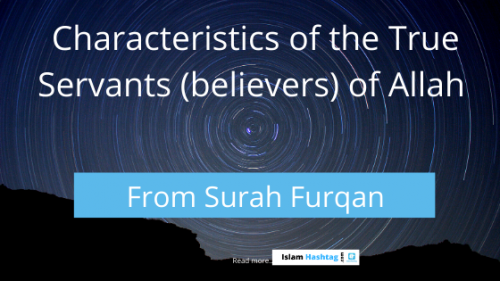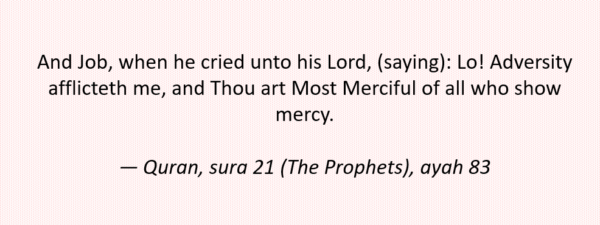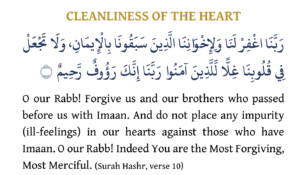10 Characteristics of True believers-Lesson from Surah Furqan.
وَعِبَادُ الرَّحۡمٰنِ الَّذِيۡنَ يَمۡشُوۡنَ عَلَى الۡاَرۡضِ هَوۡنًا وَّاِذَا خَاطَبَهُمُ الۡجٰهِلُوۡنَ قَالُوۡا سَلٰمًا
Ramadan Offer
1. The true servants of the Merciful One are those who walk on the earth gently and when the foolish ones address them, they simply say: “Peace to you”. Quran (25:63)
Subhan Allah! What a beautiful Ayah!
We can reflect on this ayah and address one of the most pressing concern in our youth today. The manner in which the models and People of pride Walk is something that is not our trait. The youth these days are so much obsessed about fashion and trends that modesty is becoming alien.
The first characteristic of the true believers of Allah to which attention has been drawn, is their gait. This is because the gait indicates the character of an individual. If a man walks in a humble and dignified way, as opposed to a haughty, vain and proud manner, it shows that he is a noble and gentle person. Thus the different gaits of different types of people show what sort of characters they possess.
The verse means to imply that the true servants of the Merciful can be easily recognized by their gait among the people. Their attitude of Allah’s worship and obedience has changed them so thoroughly that it can be seen at first sight from their gate that they are noble, humble and good natured people, who cannot be expected to indulge in any mischief.
The true believers of the Merciful do not believe in vengeance, even though they may have to deal with the ignorant people who behave rudely and insolently towards them. If they happen to come across such people, they wish them peace and turn away.
The same thing has been expressed in (Surah Al-Qasas, Ayat 55), thus: And when they hear something vain and absurd they turn away from it, saying, our deeds are for us and your deeds are for you, peace be to you, we have nothing to do with the ignorant.
وَالَّذِيۡنَ يَبِيۡتُوۡنَ لِرَبِّهِمۡ سُجَّدًا وَّقِيَامًا
2.who spend the night prostrating themselves before their Lord and standing;(25:64)
They neither spend their nights in fun and merry making nor in gossips and telling tales, nor in doing wicked deeds, for these are the ways of the ignorant people. The true servants of Allah pass their nights in worshipping and remembering Him as much as they can. This characteristic of theirs has been brought out clearly at several places in the Quran, thus: Their backs forsake their beds and they invoke their Lord in fear and in hope. (Surah As-Sajdah, Ayat 16).
اِنَّ عَذَابَهَا كَانَ غَرَامًا ۖ وَالَّذِيۡنَ يَقُوۡلُوۡنَ رَبَّنَا اصۡرِفۡ عَنَّا عَذَابَ جَهَـنَّمَ ۖ
3. Who entreat: “Our Lord! Ward off from us the chastisement of Hell, for its chastisement is one that clings.(25:65)
That is, their worship has not made them vain and proud to presume that they are the beloved ones of Allah and that the Fire of Hell will not touch them.
On the other hand, in spite of all their worship and good deeds, they are so filled with the fear of the torment of Hell that they pray to their Lord to save them from it, for they do not depend upon their own work for success in the Hereafter but upon the mercy of Allah.
وَالَّذِيۡنَ اِذَاۤ اَنۡفَقُوۡا لَمۡ يُسۡرِفُوۡا وَلَمۡ يَقۡتُرُوۡا وَكَانَ بَيۡنَ ذٰلِكَ قَوَامًا
4. The true believers of the Merciful One are those who are neither extravagant nor niggardly in their spending but keep the golden mean between the two(25:67)
The true believers of Allah adopt the golden mean between the two extremes in spending their money. They neither go beyond prudence and necessity in expenditure nor live in wretched circumstances in order to save and hoard money but are frugal.
This was the characteristic of the followers of the Prophet (peace be upon him), which distinguished them from the well-to-do people of Arabia, who were either spend thrifts in regard to the gratification of their own lusts or niggardly in spending their money on good works.
وَالَّذِيۡنَ لَا يَدۡعُوۡنَ مَعَ اللّٰهِ اِلٰهًا اٰخَرَ وَلَا يَقۡتُلُوۡنَ النَّفۡسَ الَّتِىۡ حَرَّمَ اللّٰهُ اِلَّا بِالۡحَـقِّ وَلَا يَزۡنُوۡنَ ۚ وَمَنۡ يَّفۡعَلۡ ذٰلِكَ يَلۡقَ اَثَامًا ۙ
5.The true believers refrain from three great sins: shirk, murder and adultery.
The Prophet (peace be upon him) himself warned of their gravity. According to Abdullah bin Masud, when someone asked him about the worst sins, he replied,
- It is to set up someone as equal in rank with Allah, Who has created you.
- To kill your own child for fear of its sustenance.
- To commit adultery with the wife of your neighbor. (Bukhari, Muslim, Tirmizi, Nasai, Ahmad).
Obviously this is not a complete list of the heinous sins. But these three instances have been cited because they were most prevalent in the Arab society of those days.
يُضٰعَفۡ لَهُ الۡعَذَابُ يَوۡمَ الۡقِيٰمَةِ وَيَخۡلُدۡ فِيۡهٖ مُهَانًا ۖ
اِلَّا مَنۡ تَابَ وَاٰمَنَ وَعَمِلَ عَمَلًاصَالِحًـا فَاُولٰٓـئِكَ يُبَدِّلُ اللّٰهُ سَيِّاٰتِهِمۡ حَسَنٰتٍ ؕ وَكَانَ اللّٰهُ غَفُوۡرًا رَّحِيۡمًا
His torment shall be doubled for him on the Day of Resurrection,and he will abide in it in ignominy – unless he repents and believes and does righteous works. For such, Allah will change their evil deeds into good deeds.Allah is Ever Forgiving, Most Compassionate.
وَمَنۡ تَابَ وَعَمِلَ صَالِحًـا فَاِنَّهٗ يَتُوۡبُ اِلَى اللّٰهِ مَتَابًا
6. Whosoever repents and does good, he returns to Allah in the manner that he should.
It has two meanings:
(1) When he has repented sincerely, he will start a new life of belief and obedience to Allah and by His grace and help will start doing good deeds instead of evil deeds that he used to do in his life of unbelief, and his evil deeds will be replaced by good deeds.
(2) Not only will his evil deeds done in the past be written off, but it will also be recorded in his conduct register that he was the servant who gave up rebellion against his Lord and adopted the way of His obedience. Then, as he will feel more and more sorry for his past sins and offer repentance, more and more good deeds will be credited to him. For repenting of one’s wrong doing and seeking forgiveness is in itself a good deed.
Thus, good deeds will supersede all his evil deeds in his conduct register, and he will not only escape punishment in the Hereafter but, in addition, he will also be blessed with high favors by Allah.
وَالَّذِيۡنَ لَا يَشۡهَدُوۡنَ الزُّوۡرَۙ وَ اِذَا مَرُّوۡا بِاللَّغۡوِ مَرُّوۡا كِرَامًا
7. The true believers of the Merciful One) are those who do not bear witness to any falsehood and who, when they pass by frivolity, pass by it with dignity;(25:72)
This also has two meanings:
(1) They do not give evidence (in the court of law etc.) in regard to a false thing in order to prove it right, when in fact it is a falsehood, or at best a doubtful thing.
(2) They have no intention to witness anything which is false, evil or wicked as spectators. In this sense, every sin and every indecency, every sham and counterfeit act is a falsehood. A true servant of Allah recognizes it as false and shuns it even if it is presented in the seemingly beautiful forms of art.
.وَالَّذِيۡنَ اِذَا ذُكِّرُوۡا بِاٰيٰتِ رَبِّهِمۡ لَمۡ يَخِرُّوۡا عَلَيۡهَا صُمًا وَّعُمۡيَانًا
8. who, when they are reminded of the revelations of their Lord, do not fall at them deaf and blind; (25:73)
The true servants of Allah do not behave like the blind and the deaf towards the revelations of Allah, when they are recited to them for their admonition. They do not turn a deaf ear to their teachings and message and do not deliberately close their eyes to the signs that they are asked to observe, but are deeply moved by them. They follow and practice what they are enjoined and retrain from what is forbidden.
وَالَّذِيۡنَ يَقُوۡلُوۡنَ رَبَّنَا هَبۡ لَـنَا مِنۡ اَزۡوَاجِنَا وَذُرِّيّٰتِنَا قُرَّةَ اَعۡيُنٍ وَّاجۡعَلۡنَا لِلۡمُتَّقِيۡنَ اِمَامًا
9. who are prone to pray: “Our Lord! Grant us that our spouses and our offspring be a joy to our eyes, and do make us the leaders of the God-fearing.”(25:74)
The most distinctive characteristic of the true believers is their eagerness for prayer to Allah. In (verse 65) their prayer for their own salvation and in (verse 74 )their prayer for their wives and children have been cited: Our Lord, make our wives and children true believers so that they should practice righteousness and become a source of comfort for us. Their prayer shows that the true servants of Allah are more concerned about the salvation of their beloved ones in the Hereafter than the enjoyment of the world.
We pray that we should excel in piety, righteousness and good works; nay, we should become the leaders of the pious people so that we may lead them in the propagation of virtue and piety in the world. Incidentally, this characteristic of the true servants was in great contrast to that of the disbelievers, who strove in competition and rivalry with one another for superiority in worldly power and wealth.
But it is a pity that some people in our time have misinterpreted this verse as containing sanction for seeking candidature for political leadership. According to them, the verse means: Our Lord, make us rulers over the pious people.
اُولٰٓـئِكَ يُجۡزَوۡنَ الۡغُرۡفَةَ بِمَا صَبَرُوۡا وَيُلَقَّوۡنَ فِيۡهَا تَحِيَّةً وَّسَلٰمًا ۙ
10.They are the ones who will be rewarded for their patience: lofty palaces will be granted to them, and they will be received with greeting and salutation.(25:75)
The word sabr (fortitude) has been used here in its most comprehensive sense. The true servants courageously endured their persecution by the enemies of the truth; they remained firm and steadfast in their struggle to establish Allah’s way in the land. They carried out their duties enjoined by Allah sincerely and tearlessly without any concern for the worldly losses and deprivation, and they withstood all temptations held out by Satan and all the lusts of the flesh.
.خٰلِدِيۡنَ فِيۡهَا ؕ حَسُنَتۡ مُسۡتَقَرًّا وَّمُقَامًا
(25:76) Therein they shall abide for ever: how good an abode, and how good a resting-place!
قُلۡ مَا يَعۡبَـؤُا بِكُمۡ رَبِّىۡ لَوۡلَا دُعَآؤُكُمۡۚ فَقَدۡ كَذَّبۡتُمۡ فَسَوۡفَ يَكُوۡنُ لِزَامًا
(25:77) Say to them (O Muhammad): “My Lord would not care for you were it not for your prayer.But now that you have given the lie to (the Message of Allah), an inextricable punishment shall soon come upon you.”
This warning to the disbelievers has been given in order to contrast it with the great rewards that have been promised to the true servants of Allah, as if to say: If you do not invoke Allah for help and protection, and do not worship Him, you will have no value and importance in His sight, and He will not care at all for you because He does not stand in need of any help from you. It is indeed for your own sake that He has given you the opportunity to invoke Him so that He may turn in mercy towards you; otherwise there is no difference between you and the rest of creation.
Ref : Tafseer Tafheem ul Quran.Quran
Also Read : Learning ubodiyat from the slave Master relationship of Slave Ayaz.
Lesson I learned from Surah Baqarah
Discover more from Islam Hashtag
Subscribe to get the latest posts sent to your email.







